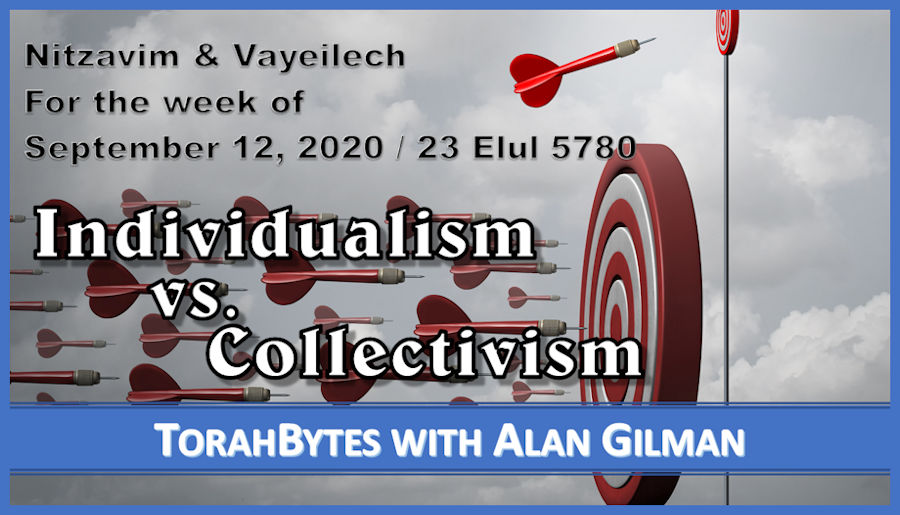For the week of September 12, 2020 / 23 Elul 5780
Nitzavim & Vayeilech
Torah: D’varim/Deuteronomy 29:9 – 31:30 (English 29:10 – 31:30)
Haftarah: Isaiah 61:10 – 63:9
Download Audio [Right click link to download]
You are standing today, all of you, before the LORD your God: the heads of your tribes, your elders, and your officers, all the men of Israel, your little ones, your wives, and the sojourner who is in your camp, from the one who chops your wood to the one who draws your water, so that you may enter into the sworn covenant of the LORD your God, which the LORD your God is making with you today, that he may establish you today as his people, and that he may be your God, as he promised you, and as he swore to your fathers, to Abraham, to Isaac, and to Jacob. It is not with you alone that I am making this sworn covenant, but with whoever is standing here with us today before the LORD our God, and with whoever is not here with us today. (D’varim/Deuteronomy 29:9-14; English: 29:10-15)
One of the cultural clashes we are experiencing in our world today is individualism vs. collectivism. Some claim the successes of the Western world are built upon stressing the value of the individual, leading to individual freedoms, rights, and responsibility. Pop culture has derived “you can be whoever you want to be” from this way of thinking. Most of the world for most of history has downplayed the individual in favor of the collective. According to collectivism, who you are and your role in life are derived solely from your family and community. According to this way of thinking you are born into a particular station in life and are expected to remain there.
Individualists reject this type of deterministic thinking and look to remove what they regard as societal obstacles usually in terms of unnecessary government controls to provide individuals the opportunity to prosper. Collectivists on the other hand put their hopes on bettering community control, through greater government involvement as the way to prevent a small percentage of individuals from gaining inordinate advantage over the masses.
The reason for the intensity of the clash between these two ways of thinking is each views the whole of reality through their particular lens. Individualism only sees individuals. They see collectivist leaders as nothing more than individuals riding the backs of the masses in the name of equality and equity. Collectivists don’t see individuals, but only an oppressive class to be replaced.
On the surface these may appear to be two different political approaches. But they are more than that, they are political approaches stemming from two different ways of seeing the world. What they have in common is that they are both wrong. Both create caricatures of the other based on skewed perceptions. Reality is best understood through a biblical lens. God’s perspective as revealed in the Hebrew Scriptures and New Covenant Writings is not just another way of looking at life. It’s the understanding of the designer of the universe himself.
According to Scripture, human beings are individuals intimately connected to identifiable groups. We see this reflected in the beginning of this week’s parsha (Torah reading portion). The people of Israel are being addressed by Moses as he nears the end of his life. That he is addressing a community is obvious. He reminds Israel that their covenant with God establishes them as a people whose community identity extends beyond the current generation. Yet, how he addresses them also emphasizes their being individuals within that community: “You are standing today, all of you, before the LORD your God: the heads of your tribes, your elders, and your officers, all the men of Israel, your little ones, your wives, and the sojourner who is in your camp, from the one who chops your wood to the one who draws your water” (D’varim/Deuteronomy 29:9-10; English 29:10-11).
Throughout the Scriptures we see the dynamic of community obligation and individual responsibility. For ancient Israel the individual was at its best when he or she earnestly lived out his or her national community obligations. The greatest community builders in Israel were those who took very lonely stands for the greater good of the people, including Joseph, Moses, and David.
The basis for the well-balanced functioning of the individual and the community is that neither derived ultimate meaning in one or the other. Instead both individual and collective meaning and value were derived from God and his word. Focus on self or focus on community blinds us from the higher view of life that only God can provide.
All scriptures, English Standard Version (ESV) of the Bible
